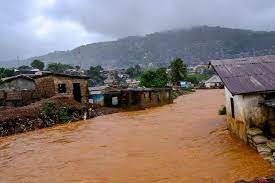Last week, the government of Sierra Leone, after repeated warnings descended on residents of Kroo Bay living on the edge of the Atlantic Ocean and destroyed homes, businesses and other establishments erected in the area. The action was necessary to save lives and put a stop to the annual loss of lives and properties in flood zones and plains across the capital, Freetown and indeed across the country. The move is in place and necessary for deterrence.
Meanwhile, the number of people across the world living in floodplains is growing. Lack of access to adequate and affordable housing coupled with the desire to be close to the city centre and political issues continue to influence people’s decisions and choices of where to settle.
This problem of people living and building permanent structures in areas prone to flooding is not new. The first human civilization centres across the world started on floodplains. Mesopotamia, as the name suggests, is a land established between two rivers. But as water levels continue to rise and fall in certain areas of the world due to rising temperatures, we are witnessing rapid desertification in some areas while we are seeing the sea reclaiming lands long lost to human development.
While this situation is not limited to Sierra Leone, our situation is however dangerous as we lack the resources and manpower to effectively deal with flooding and the human and material costs associated with homes and lives lost to flooding. In other words, we do not have the financial and human resources capacity to deal with flooding and the associated losses.
But the decision remains that people living in such areas across the country must, as a matter of priority that is devoid of political gains consideration, move from such areas. However, moving poor and other people living in floodplains must come with change to how the issue can be managed now and in the future.
To put an immediate pause to people living in floodplains we must first understand why they do. Economic issues continue to top the list with fleeing political violence forming part of people’s reasons for moving to floodplains. Lack of infrastructure in the locations people migrate from should also be addressed making it necessary for government to decentralise its services and programmes.
But the most important first should be that a moratorium is declared on future construction and land ownership in such areas. The lands ministry should be instructed not to sell land or award land deeds to anyone claiming lands in danger zones. It should be totally unheard of for anyone to claim land in areas that should be considered protected. The reason they are protected is that their value goes beyond economic as their abuse affects human survival. Building on these protected areas has repercussions even on people living far from them.
People living on the edge of floodplains who are out of the danger zone must report on others claiming or building in such areas as posing a threat to their collective survival and security. Such homeowners must act as a buffer zone between illegal occupation and tenancy of such areas and the need for the government to immediately move in and rectify the situation before a permanent settlement is established.
People that have bought land, that have constructed permanent structures for business and leisure would be hard to convince if government fails to provide a proper alternative for resettlement. The government of Sierra Leone must make land available for people to be resettled with land titles given out to those moving to the relocation zone. These areas must have all the amenities necessary for the survival of a community including schools, healthcare centres, provision of electricity, police station, roads, sewage and WASH facilities.
Rounding up the discussion comes with an advice. Sierra Leoneans and many local and international organisations have routinely come to the aid of people flooded out of their homes. The pictures of their ordeals appeal to our sense of community and we rush to their sides with whatever materials or cash to help assuage their plights. Meanwhile we see that this yearly aid that is tied to environmental and other disasters relating to human error like fire has become a hustle, a scam by people dwelling in such areas who despite repeated calls to relocate continue to stay put.
Cutting off the support they get from a danger that is annual, a danger they should expect must inform members of the public that our charity is being wasted on such people while others who are more vulnerable are in desperate need of such largesse from a caring and concerned public. By routinely running to their aid we are encouraging the problem without considering funding the government’s plans to relocate people living in environmentally dangerous zones across the country.
Finally we need more investment in flood mitigation efforts from the central government as those that are in place, including the removal of people and the destruction of permanent structures, are certainly not enough, and are not working. Lonta!
By Jerry Saccoh Kai-Lewis










